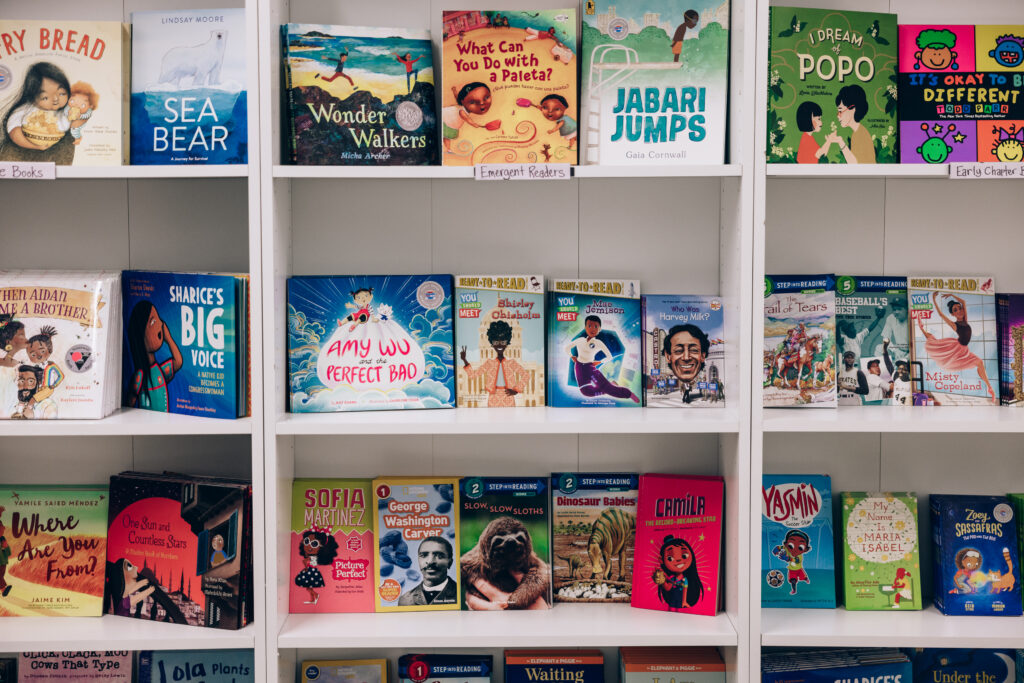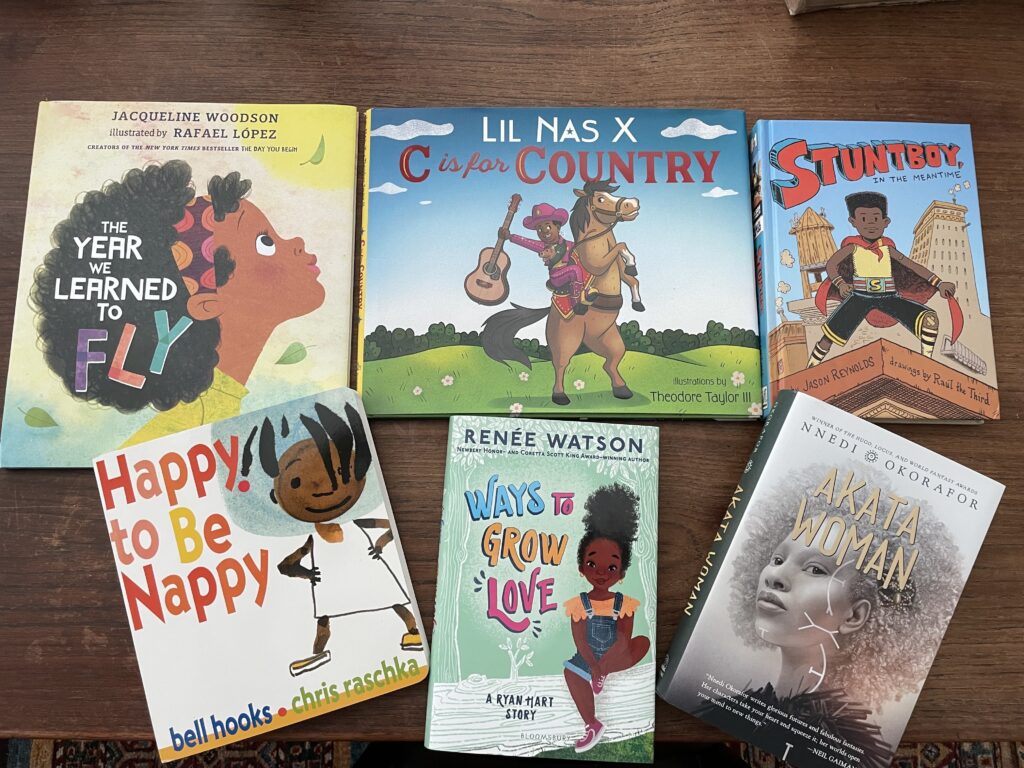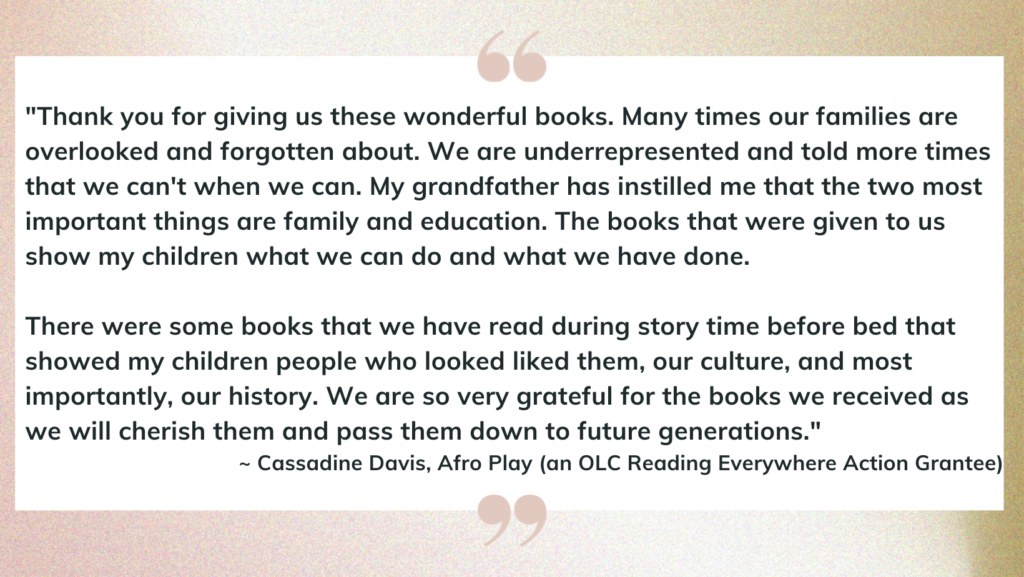Blog
How Does the OLC Choose the Books We Source?
Share
Staying True to Our Values in Book Selection
How We Get Books to the Community
The Oakland Literacy Coalition has the honor of sourcing and curating books for Oakland students to access through our citywide network of schools and community organizations. We view this as a privilege, an opportunity to live into our values about literacy and community, and a way to promote social change through the power of books.
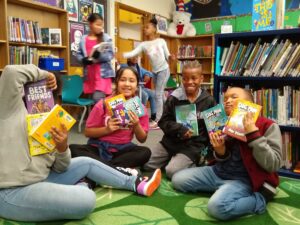
Through our Reading Everywhere Action Grants, we provide books to community groups working with students outside of school time. We support OUSD school libraries with Books Kids Want to Read grants so library staff can stock their libraries with new, high interest books. We curate book lists of some of the best diverse classic and recent children’s books and partner with organizations like Eat. Learn. Play. and Mathical to distribute books to students and teachers across the city.
Across all these programs, we seek to create opportunities for students to choose from a range of high quality, high interest, age-appropriate books. A Scholastic White paper on Reading Choice, Time, and Pleasure says that the more freedom students have to choose what they read, the more likely they are to read the book, understand it, and read more, saying, “An essential aspect of becoming a real reader is knowing yourself as a reader—made possible through wide reading driven by access to abundant books and personal choice.”
Weaving Our Core Values into Book Sourcing
At the OLC, we believe that literacy enables learning and liberation. One of our core values is Equity: we believe that students and families deserve the support they need to learn and access their civil right to literacy, and we center the needs of students from historically marginalized communities.
Oakland students need books they can decode as they learn to read AND books that will spark a love of learning. The OLC has advocated for and is encouraged to see more schools instituting curriculum that follows the science of reading and providing their students with decodable books to help them learn to read. We also continue to curate books which inspire students to think critically and love reading — books that are culturally relevant, representative, and historically accurate.
The OLC also follows the research on the power of English Learner students reading and building literacy in their home language. We work to curate and source books in many languages spoken by Oakland families, from Spanish to Vietnamese, Mam, and Arabic, and we strive to procure books written by native speakers that reflect their cultural identities and stories, rather than translations of English language books.
We have been heavily influenced by the work of professor Rudine Sims Bishop, whose seminal article, “Windows, Mirrors, and Sliding Glass Doors” talks about the importance and power of culturally affirming and representative children’s books. Dr. Bishop writes: “When children cannot find themselves reflected in the books they read, or when the images they see are distorted, negative, or laughable, they learn a powerful lesson about how they are devalued in the society of which they are a part.” She goes on, “Children from dominant social groups have always found their mirrors in books, but they, too, have suffered from the lack of availability about others. … In this country where racism is still one of the major unresolved social problems, books may be one of the few places where children who are socially isolated and insulated from the larger world may meet people unlike themselves.”
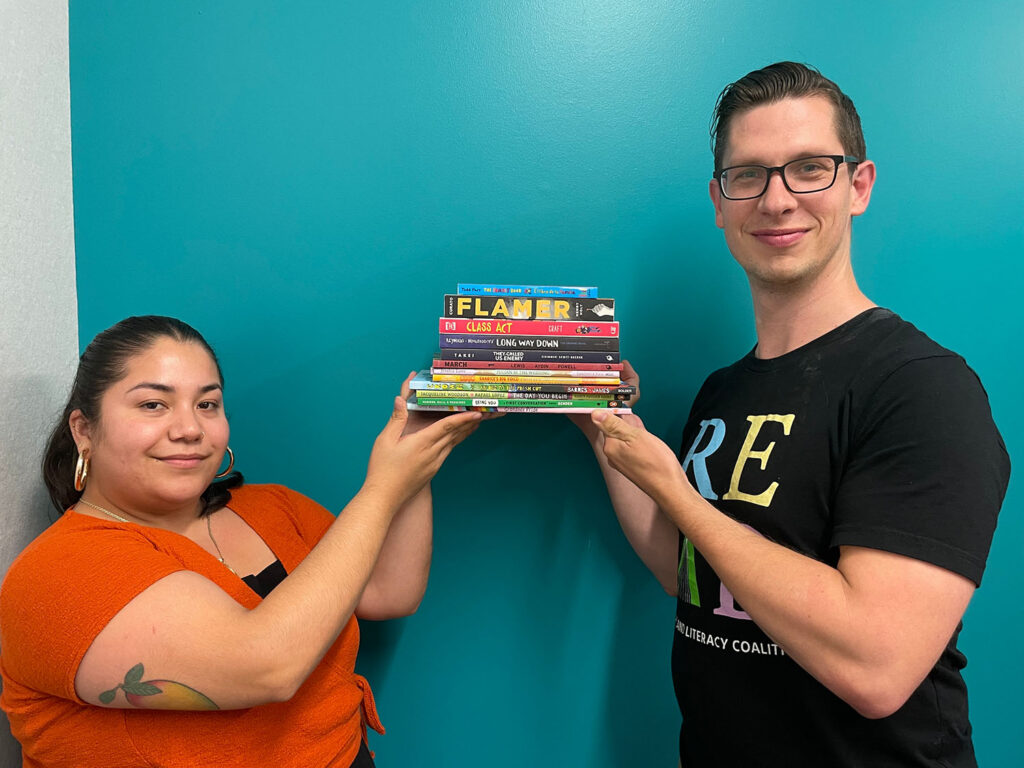
This speaks to another of our core values: Anti-Racism: fulfilling our mission requires naming, confronting, and dismantling racism. As the Cooperative Children’s Book Center (CCBC) says, “The past decade has seen a significant increase in the number and percentage of diverse books published for children and teens, and the number of diverse book creators . . . At the same time, it’s impossible to talk about diverse books today without also talking about the fact that they are coming under attack; they are the focus of censorship attempts across the country.” According to the American Library Association, “The number of reported challenges to books doubled in 2022 — and the number of challenges to unique titles was up nearly 40 percent over 2021.”
In this time of increased book bans targeting books that address race, gender identity, and sexuality, it is essential that we promote, celebrate, and ensure access to diverse books which highlight the history, realities, and joys of marginalized communities. We are pleased that Governor Newsom signed AB1078 last month, prohibiting book bans and censorship of instructional materials, and requiring that schools provide textbooks that teach about the diverse communities that make up California.
The Impact of a Good Book
We believe in the power of a good book to change lives or help a child get excited about reading. We also know that a “good” book is subjective — what speaks to one child might not appeal to another, in terms of story, subject matter, illustrations, or format. For this reason, we source a large variety of books: fiction, non-fiction, graphic novels, biographies of athletes and community heroes, Afro-futurism, memoirs, and more.
In addition to representative, own voices books, we also love helping kids find any story that interests them. Our staff have seen the power of graphic novels and comics to light the spark that begins students on their journey to love reading. Students who struggle with reading, or don’t enjoy it, will often choose a graphic novel because the text is accessible to them, which enables them to comprehend what they’re reading, and the pictures make the story come alive. As these students become more confident readers who enjoy reading, they read more.
First Book Research & Insights recently published the results of a study of 450 educators which demonstrated the positive impact that increasing access to diverse books had on both students’ interest in reading and reading scores. They found that: “Classrooms that added bilingual titles and titles representing the LGBTQ+ community had the greatest improvement in student reading scores.” However, they also found that “Educators believe that diverse books are important, but diverse books are a small percentage of their classroom libraries…75 percent of participants reported serving predominantly children of color. Yet diverse titles on average comprised only 28 percent of educators’ libraries.
This is where the OLC plays a key role in sourcing books for students through school libraries and outside of school time. Time and time again, we see children gravitate towards books that reflect their experiences and teach them about the experiences of others.
Learn More & Get Involved
We encourage all educators, families, and community members to explore the myriad of new and classic representative books, and to become advocates for book choice and against book bans. Here are some ways you can learn more and take action:
-
Buy books from the Multicultural Book Store and First Book Marketplace (available to schools and nonprofits), which encourages reading by offering a diverse range of affordable books for educators and those eager to build excitement around reading.
-
Read about the Diverse Books For All Coalition’s efforts to distribute 600,000 diverse children’s books.
-
Read the Cooperative Children’s Book Center’s piece on what the statistics they gather about children’s book diversity mean.
-
Read about how “Librarians Are the New Queer Front Lines”, visit the Oakland Public Library, and support Friends of the Oakland Public Library (FOPL).
-
Unite Against Book Bans has information and toolkits for advocacy you can do from home
-
Support the OLC’s work to get books out to Oakland kids through school libraries and in the community. You can sign up to volunteer, or donate to sustain these programs.




